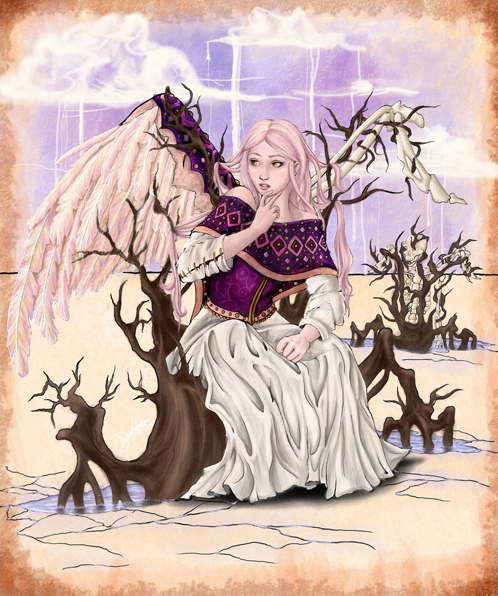
art by Shannon N. Kelly
Nilly
by Benjamin Rosenbaum
j: in quaternion theory, a meta-imaginary number, orthogonal to both the real number line (1, 2, 3...) and the imaginary number line (i, 2i, 3i...)--symbol j, formalized by Sir William Rowan Hamilton in 1843 AD.
Usually, when a boy dies, his imaginary friend goes with him, to gambol in fields of light... or something. Or, at least, it imagines that it does.
But in Nilly's case, the boy's little sister Meg had met him ("See? He's hiding behind that shelf--come out, Nilly.") and Nilly thought he might become her imaginary friend.
Meg wanted to forget that game. She broke the toys the dead boy had given her. She threw a framed 8"x11" family portrait out the window into the muddy garden.
Her parents sent her to her room without supper. They yelled, "How could you do that?" locked her door, and slammed cupboards in the kitchen. This suited Meg far better than if they'd said awful things like, "I know you miss him, honey." Meg's bed was a glacier a thousand miles high, her carpet a thousand miles of impassible desert sand, and a red storm rose in the night. She hugged her stuffed animals and smelled lightning.
Nilly, however, kept trying to stand in her line of vision. Perhaps they could play. He was lonely.
She kept turning her face away, and he kept following.
If I cannot be your imaginary friend, he thought in a rush of anger, I'll be your imaginary enemy. But then she squeezed her eyes shut, and he felt a stab of terror and remorse. "Wait," he said, as aloud as he could. Too late. Meg opened her eyes, and sure enough, she'd mastered the trick, her cultural patrimony, the crown jewel of her civilization, that invigorating willful ignorance--the unseeing of spirits. She looked where he'd been, and only saw the books on the shelf.
Now Nilly was really stuck.

There had been others--Dally, Sandra, Foop, Mango Mango, and the Super Trash Robot Queen. They'd all gone with the boy. There was a land, too, Nillydallyland, and Nilly could slip into it: but it wasn't away. It was just interleaved with the dead boy's house. Its dense, sticky jungles were contiguous with the underside of the dining room table, its dark reaches of loud night nestled between the washer and the dryer, its snowblinding tundra beneath the blank ceramic tiles of the kitchen floor. After days of wandering through the jungle, you'd emerge onto the yellow carpet of the dining room. A deserted, empty land, with no adventures left to it.

The house across the street had a plastic castle in its yard. Turrets, and a slide. There must be a child there. Only a very desperate imaginary friend would try to claim a strange child who'd never seen it, but Nilly would have tried, if he could have crossed the lawn.
Grass and sky--it was mixed up in Nilly's mind with the bad camping trip. Grass under his feet, the oaks above him: he could last a minute or two before he heard the thunder of the white water, and felt the pressure in the boy's lungs.
He had been the one there at the end. Not Sandra, not Dally, not the Queen.
"Hey, you're killing me here," someone said.
Nilly started as if he'd fallen into cold rapids. There was a woman next to him on the living room sofa. In the first instant he'd thought it was the Mom--that she could suddenly see him. But it was another woman, in a bathrobe, with tousled black hair and incandescent blue eyes, wet and steaming, droplets beaded on impossibly smooth skin.
"Who are you?" Nilly asked.



